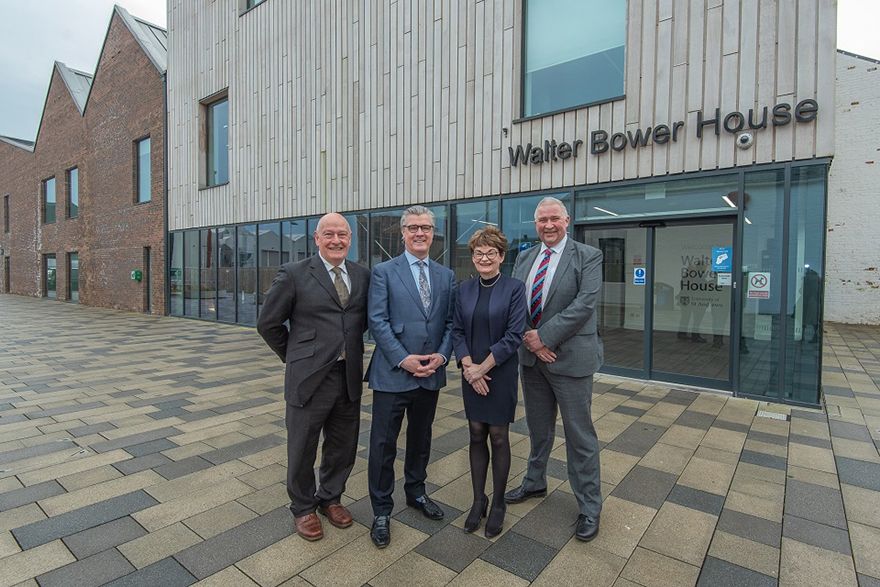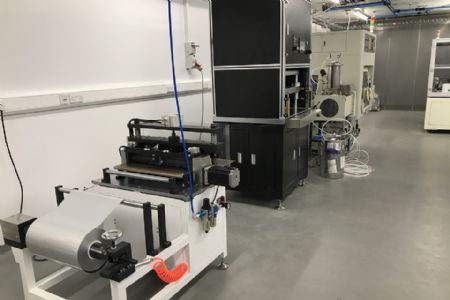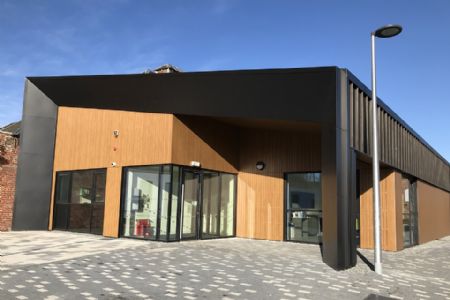 Geoff Morris, director of the Eden Campus; Malcolm Offord, UK Government Minister for Scotland; Professor Dame Sally Mapstone, principal and vice-chancellor; Derek Watson, quaestor and factor at the University of St Andrews Eden Campus in Guardbridge
Geoff Morris, director of the Eden Campus; Malcolm Offord, UK Government Minister for Scotland; Professor Dame Sally Mapstone, principal and vice-chancellor; Derek Watson, quaestor and factor at the University of St Andrews Eden Campus in GuardbridgeThe next generation of battery technology will benefit from a new research facility at the University of St Andrews Eden Campus, helped by UK and Scottish Government funding. UK Government Minister for Scotland Malcolm Offord was recently given a preview of the new battery prototyping facility, or ‘dry lab’, located at the
University of St Andrews Eden Campus at the former paper mill in Guardbridge. The special ultra-low humidity environment is the first of its kind in Scotland, and will enable companies and researchers to develop and evaluate battery prototypes before they are manufactured in battery gigafactories.
In the dry lab the atmosphere is treated to greatly minimise moisture, creating conditions that allow battery materials to be handled and tested for the most efficient battery operation. The principal technology produced will be pouch cells — these are stacked together to form large-scale batteries for either electric vehicles (EVs) or static power storage, both of which are essential to the transition to a ‘net zero’ economy.
 Pictured right: Inside the Eden Campus battery prototyping facility ‘dry lab’
Pictured right: Inside the Eden Campus battery prototyping facility ‘dry lab’Mr Offord said: “This dry lab is exactly the sort of facility that Scotland and the UK require to develop our future battery industry. This will help to deliver on the Prime Minister’s priorities to grow our economy and create better-paid jobs by putting the country at the cutting edge of the transition to ‘net zero’. The UK Government is investing £24.5 million in the Eden Campus as part of more than £2.2 billion for levelling up right across Scotland.”
The £4.7 million ‘Dry Lab Project’ is supported by £3.3 million from the UK Government as part of its £24.5 million investment in the Eden Campus through the ‘Tay Cities Region Deal’. The Scottish government is also investing £2 million in the Eden Campus through the deal, and further funding for the lab is coming via the
Scottish Enterprise Advancing Manufacturing Challenge Fund and the
Faraday Institution.
The University of St Andrews is pioneering new battery chemistries and leads the Faraday Institution sodium-ion project. Through this cross-UK research, scientists hope to create a next-generation sodium-ion battery that is cheaper, more efficient and better for the environment than current technologies. This is important as there are concerns about the environmental impact of supplying the increasing demand for lithium-ion batteries.
Last autumn the UK Government awarded a further £211 million to the ‘Faraday Battery Challenge’ to boost research and development across the batteries sector, including key industries such as EV batteries.
 Pictured left: The dry lab is part of the Eden Campus at Guardbridge
Pictured left: The dry lab is part of the Eden Campus at GuardbridgeMr Watson said: “The development of the Eden Campus as a centre for innovation and entrepreneurship with ‘state of the art’ facilities like the dry lab, provides opportunities for academia and industry to forge dynamic new partnerships and work on world-leading research together. This is so important to achieving a sustainable, low-carbon future, as well as the wider economic transformation of Scotland and the UK.”
Professor Pam Thomas, CEO at the Faraday Institution, said: “This new battery facility at St Andrews marks a significant step forward in our mission to support the UK commercialisation of sodium-ion batteries. The ‘state of the art’ equipment will enable researchers to combine and test cutting-edge materials, paving the way for the development of commercially relevant cells.”
Situated four miles outside of St Andrews, the village of Guardbridge was in steady decline following the closure of the papermill in 2008 and the loss of over 400 local jobs. The Eden Campus is repurposing the historic buildings to create a new centre for enterprise and innovation. Over 500 people now work at the Campus and by 2030, this number is expected to double.